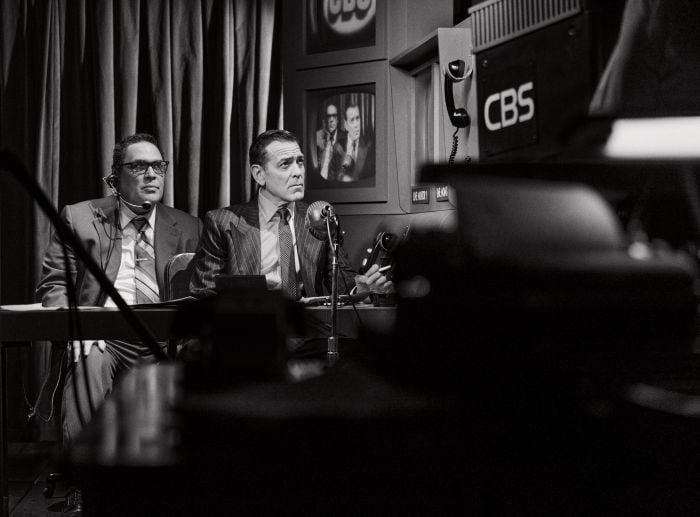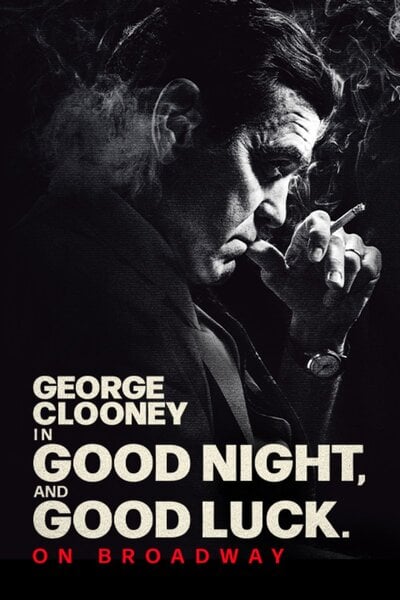On March 9, 1954, veteran CBS broadcast journalist Edward R. Murrow challenged the ethics and veracity of Junior Senator Joseph McCarthy and his aggressive anti-communist campaign and claims of widespread US infiltration, known as the Red Scare, on his live news program See It Now. The Broadway premiere of Good Night, and Good Luck, named for the newscaster’s signature sign-off line and adapted from the eponymous 2005 film by George Clooney and Grant Heslov, depicts the pivotal real-life conflict between the two powerful men of the mid-century, which contributed to the eventual downfall of McCarthy, set the standards for media integrity, and earned Murrow a Peabody Award, honoring outstanding achievement in broadcasting. Now playing a limited engagement at the Winter Garden Theatre, the hard-hitting historical drama continues to resonate in our current times, with its issues of political fearmongering, fake news, and freedom of the press.

Staged against the backdrop of 1950s America, during the first term of Republican President Dwight D. Eisenhower, the production combines live action with tightly framed live feed and original black-and-white news footage of the actual figures and events (with Jessica Kahkoska serving as archival researcher) projected on large screens and viewed on monitors at the sides of the proscenium (clear video/projections by David Bengali, with readily intelligible sound by Daniel Kluger). Scott Pask’s bi-level set authentically recreates the offices, control room, and studios of the old CBS headquarters in Grand Central Station, with vintage cameras, microphones, telephones, and desks, and an arched upstage window identifying the location. Heather Gilbert’s low lighting accentuates the monochromatic palette of television broadcasts of the ‘50s, then shifts to the bright illumination of the studio lights for the on-air segments. And mid-century-style costumes by Brenda Abbandandolo, and hair and wigs by Leah J. Loukas, likewise transport us to the era, as does the characters’ incessant cigarette-smoking (often immersing the front rows of the audience in clouds of smoke).
Under the riveting direction of David Cromer, two-time Oscar winner Clooney (who hasn’t appeared on stage in an Equity theater since 1986) makes a commanding and award-worthy Broadway debut as Murrow, capturing his serious demeanor, slow and deliberate speech pattern (voice and dialect coaching by Gigi Buffington), and the gravitas of his direct and steady eye contact with the camera, delivering his concerns, the friction he faces, the sardonic humor he shares with his closest associates, and his unwavering determination to take a stand, at the risk of losing the support of viewers, sponsors, and advertisers, and becoming McCarthy’s next target. He fully embraces and embodies the ethical principles and journalistic integrity so articulately espoused by Murrow, and his belief that holding the government accountable for its actions is the responsibility of all citizens.

Clooney is supported by a top-notch featured cast and ensemble of twenty-one that contributes to the active and invested atmosphere of the studio and the pressures it endured. Among the standouts is Glenn Fleshler as Fred Friendly, the behind-the-scenes co-producer, with Murrow, of See it Now, who sometimes expresses his doubts, but remains friends and partners with Murrow, contributes some dark laughs about the situation, agrees to risk exposing McCarthy’s dishonest assertions and unwarranted anti-Communist campaign, and even splits the cost of the broadcast with Murrow after sponsors withdraw and the show is moved to a less popular time slot.
That news is delivered by Paul Gross as the stern and strategic Bill Paley, the head of the entire CBS network, who declines to give his formal endorsement of the show’s critical content but doesn’t stop it, despite the potential consequences and largely in recognition of the meticulous research, verification of sources (with Murrow not just quoting McCarthy, but airing clips of him speaking his own words), and widespread popularity of the host (though, as Murrow notes, polls show he’s not as popular as Milton Berle!). And Clark Gregg turns in an empathic portrayal of Don Hollenbeck, another CBS journalist who supports Murrow, manifesting the unbearable anxiety he experiences after unfounded accusations of being a communist sympathizer, which cause him irreparable stress and damage.
There are two additional story lines that expand the overall theme. Ilana Glazer and Carter Hudson play the not-so-secretly married couple Shirley and Joe Wershba, during a time that prohibited relationships between colleagues in the workplace – another egregious example of overarching control by those in power, and the fear of those affected by it. And Georgia Heers brings her smooth and resonant voice to the role of Ella, opening the play behind a sheer stage curtain with a time- and tone-setting song from the blues canon of the great Fitzgerald, then appearing between scenes in the recording studio on the set’s second level, accompanied by Joe Block on keys, Mark Lewandowski on bass, Lucas Pino on tenor sax, and music director Bryan Carter (who also provided the arrangements and orchestrations) on percussion, performing other numbers from the singer’s famous repertoire, with expressive lyrics that underscore the concerns and feelings of the main plot and people.

Rounding out the across-the-board compelling company as some of the other important players in the drama are Mac Brandt as Colonel Anderson, Will Dagger as Don Hewitt, Christopher Denham as John Aaron, Fran Kranz as Palmer Williams, Jennifer Morris as Millie Green, Michael Nathanson as Eddie Scott, Andrew Polk as Charlie Mack, and Aaron Roman Weiner as Don Surine, and the ensemble of R. Ward Duffy, Joe Forbrich, Imani Rousselle, Greg Stuhr, JD Taylor, and Sophia Tzougros as members of the CBS staff, creating a busy and believable work environment for the show.
The true events depicted in Good Night, and Good Luck not only speak to the McCarthy era but are also relevant to our present divisive time and government. It’s a powerful statement that is reinforced at the conclusion with Murrow’s incisive speech, delivered with resolve by Clooney and supported by a video projection of images tracing the decades that followed and the cycles in history, reminding us to take responsibility and to stand up against tyranny, posing the question, “What are you prepared to do?.” My recommendation: see it and do it.
Running Time: Approximately 80 minutes, without intermission.

Good Night, and Good Luck plays through Sunday, June 8, 2025, at the Winter Garden Theatre, 1634 Broadway, NYC. For tickets (priced at $176-799, including fees), go online.
Before you go, you can watch the trailer here:



